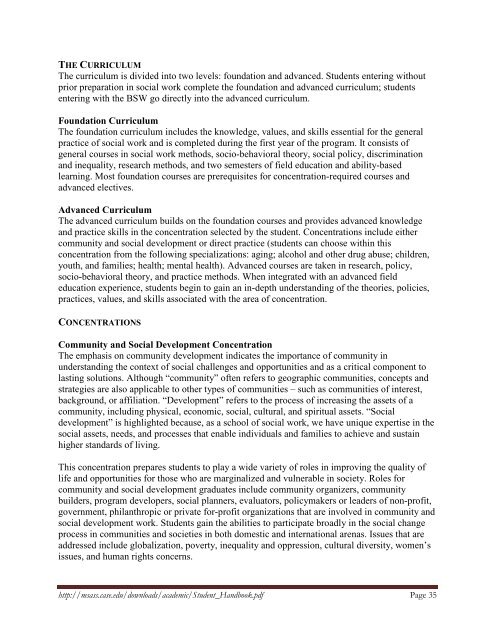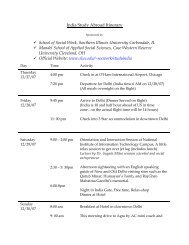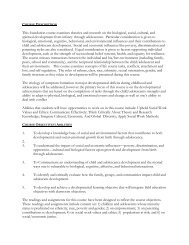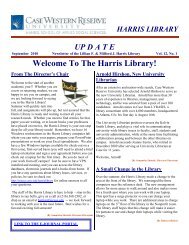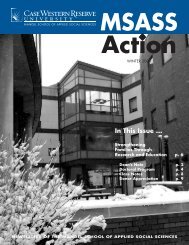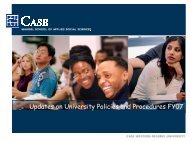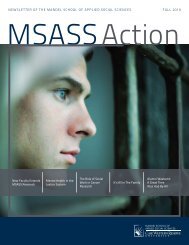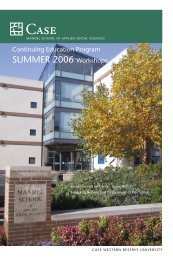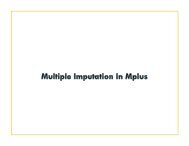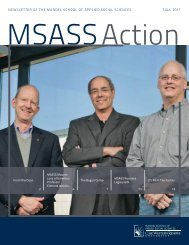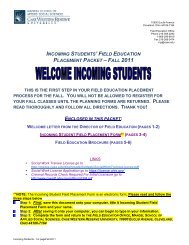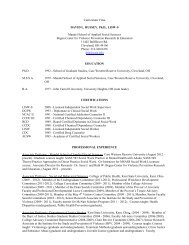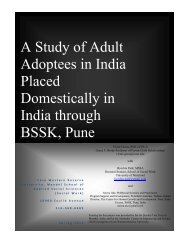Student Handbook - Mandel School of Applied Social Sciences ...
Student Handbook - Mandel School of Applied Social Sciences ...
Student Handbook - Mandel School of Applied Social Sciences ...
Create successful ePaper yourself
Turn your PDF publications into a flip-book with our unique Google optimized e-Paper software.
THE CURRICULUMThe curriculum is divided into two levels: foundation and advanced. <strong>Student</strong>s entering withoutprior preparation in social work complete the foundation and advanced curriculum; studentsentering with the BSW go directly into the advanced curriculum.Foundation CurriculumThe foundation curriculum includes the knowledge, values, and skills essential for the generalpractice <strong>of</strong> social work and is completed during the first year <strong>of</strong> the program. It consists <strong>of</strong>general courses in social work methods, socio-behavioral theory, social policy, discriminationand inequality, research methods, and two semesters <strong>of</strong> field education and ability-basedlearning. Most foundation courses are prerequisites for concentration-required courses andadvanced electives.Advanced CurriculumThe advanced curriculum builds on the foundation courses and provides advanced knowledgeand practice skills in the concentration selected by the student. Concentrations include eithercommunity and social development or direct practice (students can choose within thisconcentration from the following specializations: aging; alcohol and other drug abuse; children,youth, and families; health; mental health). Advanced courses are taken in research, policy,socio-behavioral theory, and practice methods. When integrated with an advanced fieldeducation experience, students begin to gain an in-depth understanding <strong>of</strong> the theories, policies,practices, values, and skills associated with the area <strong>of</strong> concentration.CONCENTRATIONSCommunity and <strong>Social</strong> Development ConcentrationThe emphasis on community development indicates the importance <strong>of</strong> community inunderstanding the context <strong>of</strong> social challenges and opportunities and as a critical component tolasting solutions. Although “community” <strong>of</strong>ten refers to geographic communities, concepts andstrategies are also applicable to other types <strong>of</strong> communities – such as communities <strong>of</strong> interest,background, or affiliation. “Development” refers to the process <strong>of</strong> increasing the assets <strong>of</strong> acommunity, including physical, economic, social, cultural, and spiritual assets. “<strong>Social</strong>development” is highlighted because, as a school <strong>of</strong> social work, we have unique expertise in thesocial assets, needs, and processes that enable individuals and families to achieve and sustainhigher standards <strong>of</strong> living.This concentration prepares students to play a wide variety <strong>of</strong> roles in improving the quality <strong>of</strong>life and opportunities for those who are marginalized and vulnerable in society. Roles forcommunity and social development graduates include community organizers, communitybuilders, program developers, social planners, evaluators, policymakers or leaders <strong>of</strong> non-pr<strong>of</strong>it,government, philanthropic or private for-pr<strong>of</strong>it organizations that are involved in community andsocial development work. <strong>Student</strong>s gain the abilities to participate broadly in the social changeprocess in communities and societies in both domestic and international arenas. Issues that areaddressed include globalization, poverty, inequality and oppression, cultural diversity, women’sissues, and human rights concerns.http://msass.case.edu/downloads/academic/<strong>Student</strong>_<strong>Handbook</strong>.pdf Page 35


